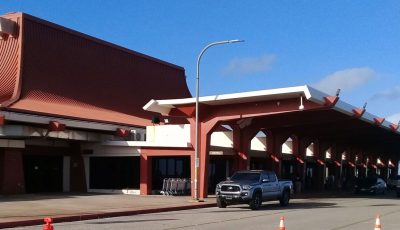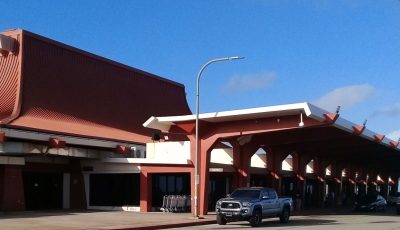3 options for CPA’s concession program
With DFS’ master concession agreement with the Commonwealth Ports Authority expiring on Nov. 13, consultant Ricondo & Associates has presented CPA with three options: a successor master agreement, a duty-free retail concession agreement, or a duty-free retail concession agreement-prepaid.
Noted by Ricondo as the “easiest” option, the first option would bypass a solicitation process and allow DFS to continue as the master concessionaire operating the food and beverage program at the airport.
If CPA wishes to improve its food and beverage program and initiate a new concessions program, DFS has a wide range of contacts in the industry to help with this endeavor, Ricondo stated.
Ricondo reported that the current food and beverage program at the Saipan International Airport under DFS “yields revenues that indicate excellent sales.”
With the second option, CPA could benefit from competition of bids from multiple concessionaires, according to Ricondo. But the option would separate the food and beverage program at the airport under a non-duty-free concession agreement.
“It is unclear whether or not the food and beverage at [the Saipan airport] is sufficient to interest national and international food and beverage concessionaires,” Ricondo said.
CPA would have to determine if it is equipped to bear the administrative burden of managing its own food and beverage program, Ricondo said.
Finally, a “fatal flaw” in this option, according to Ricondo, is the prescribed five-year agreement, which Ricondo described as “uncommonly short.”
“It would prevent a concessionaire from investing in a product of a high enough quality to satisfy both the CPA and its international passengers,” it stated.
The third option would be needed if CPA needed a source of funds to implement a capital improvement project. A prepayment of rent in the agreement would produce such funds.
While the report noted that CPA has identified no such need, Ricondo recommended that the duty-free store be expanded, the security screening checkpoint at the airport be widened or expanded, and the food and beverage zone reconfigured to have “100 percent” of departing passengers flow through.
Like the second option, a food and beverage program would be under a separate concession agreement.
DFS’ original contract was for 20 years and was executed in 1985. Its 1997 successor was for 10 years and started in 2005.
‘Remove parameters’
While Ricondo defined the options available to CPA, they also recommended to remove or sunset the law that sets the parameters for the RFP process and the types of concession agreements defined all together.
Right now, under Public Law 4-60, CPA can only enter into three prescribed concession agreements: duty-free retail concession, a master concession, and non-duty-free concession agreement.
The duty-fee retail concession agreement grants the exclusive right to operate facilities at a port of entry to deliver duty-free merchandises.
The master concession, currently in place between DFS and CPA, grants the exclusive right to operate facilities—at each and every port—for sale of duty-free merchandise or any other items.
A non-duty free concession can be used with a duty-free retail concession or separately, at a single port of entry, to sell exclusively all or specified non-duty-free merchandise.
The law also prescribes the concession leasing strategy that CPA may pursue.
“It is uncommon for an airport operator’s contractual process to be so specifically prescribed by its legal/political structure,” the report stated.
Rota and Tinian
Ricondo viewed the opportunity of a duty-free store on Tinian or Rota as “impractical.”
They cited the lack of direct flights to international destinations from these airports as a reason. They also noted infrastructure at these airports would have to be improved.
“Passenger traffic is quite low, generating a demand that may be too low to result in the sales that would enable a concessionaire to recover its costs,” the reported stated.
They also described air service as “unstable,” noting the bankruptcy of Freedom Air and the service disruptions of Cape Air.



























